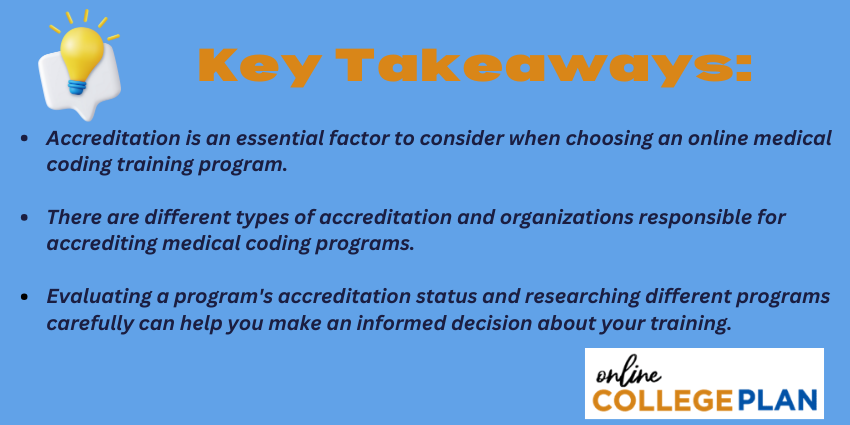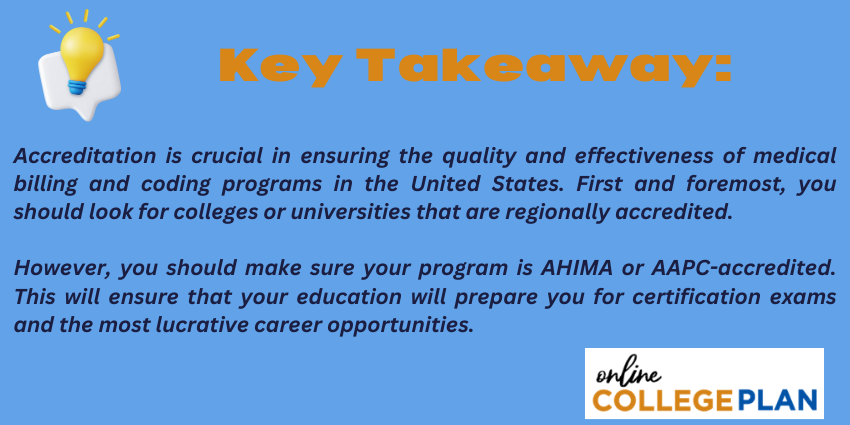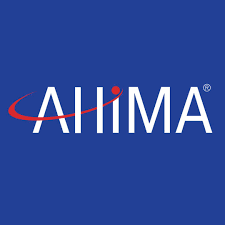Are Online Medical Coding Training Programs Accredited?

Find your degree
If you’re interested in pursuing a medical coding career, you may wonder whether online training programs are accredited. Accreditation is one of the most important factors to consider when choosing any certificate or degree program. It ensures that the school (and the program itself) meets certain standards of quality and rigor.
In this article, we’ll explore the accreditation process for online medical billing and coding programs. We’ll delve into the accreditation process for these programs, explaining the different types of accreditation and the organizations responsible for accrediting medical coding programs. We’ll also provide guidance on evaluating whether a program is accredited and what to look for when researching different programs.

Overview of Medical Coding Training Programs
Medical coding degrees and certificates are designed to prepare you for a great-paying career in the field by teaching you the skills and knowledge you need to succeed. However, many different types of medical coding training programs are available, including online programs, in-person programs, and hybrid programs that combine online and in-person learning. Each program has its advantages and disadvantages, so it’s important to research and choose the program that’s right for you.
Online Medical Billing and Coding Programs
Online College Plan deals primarily with online colleges and degree programs. So, most of our rankings for the best medical coding training programs are for online certificates or degrees. These programs allow you to complete your coursework online from wherever you live. The time to complete a medical billing program can vary. However, many of these programs are self-paced, which means you can complete them as quickly or as slowly as you like.
Accreditation
When choosing an online medical coding training program, it’s vital to ensure the program is accredited. Accreditation is a process by which a program is evaluated by an independent organization to ensure that it meets specific standards of quality. But why is it so important?
Quality assurance: Accreditation ensures that colleges and universities meet certain quality standards regarding faculty, curriculum, facilities, and student support services.
Transferability of credits: Accredited colleges and universities make it easier for students to transfer credits between institutions, allowing for greater flexibility in pursuing higher education.
Employer recognition: Accreditation enhances the credibility of a college or university, making degrees and credentials more widely recognized and accepted by employers.
Eligibility for Federal Financial Aid: Most forms of federal financial aid, including grants, loans, and work-study programs, require students to attend accredited institutions.
Access to Certain Opportunities: Some professional certifications, licensures, and graduate programs may require applicants to have completed their education at an accredited institution.
Accreditation Process for Online Programs
If you are considering an online medical coding training program, you won’t want to waste time and money on schools and programs that are not accredited. In this section, we will discuss the accreditation process for online programs.
Regional Accreditation
Regional accreditation applies to colleges, universities, and other higher education institutions in the United States. It is based on the geographical region where the school is located. There are seven regional accrediting agencies in the United States. When researching the best medical billing and coding program, you’ll want to be sure that the schools on your list are regionally accredited by one of the following organizations:
Higher Learning Commission (HLC): Accredits institutions in Arizona, Arkansas, Colorado, Illinois, Indiana, Iowa, Kansas, Michigan, Minnesota, Missouri, Nebraska, New Mexico, North Dakota, Ohio, Oklahoma, South Dakota, West Virginia, Wisconsin, and Wyoming.
Middle States Commission on Higher Education (MSCHE): Accredits institutions in Delaware, the District of Columbia, Maryland, New Jersey, New York, Pennsylvania, and Puerto Rico.
New England Commission of Higher Education (NECHE): Accredits institutions in Connecticut, Maine, Massachusetts, New Hampshire, Rhode Island, and Vermont.
Northwest Commission on Colleges and Universities (NWCCU): Accredits institutions in Alaska, Idaho, Montana, Nevada, Oregon, Utah, and Washington.
Southern Association of Colleges and Schools Commission on Colleges (SACSCOC): Accredits institutions in Alabama, Florida, Georgia, Kentucky, Louisiana, Mississippi, North Carolina, South Carolina, Tennessee, Texas, and Virginia.
Western Association of Schools and Colleges Senior College and University Commission (WSCUC): Accredits institutions in California, Hawaii, and the Pacific Basin.
Accrediting Commission for Community and Junior Colleges (ACCJC): Accredits community colleges and other associate degree-granting institutions in California, Hawaii, and the Pacific Basin.
Regional accreditation is considered the gold standard of accreditation in the US. It is based on comprehensive evaluations of each school’s academic programs, faculty qualifications, student services, financial stability, and other factors.
Credits earned at a regionally accredited school are easily transferable to other colleges and widely recognized by employers and graduate schools. This is particularly important if you decide to return to college to advance your career. For example, many medical coding professionals choose to continue their education by pursuing degrees in health informatics, healthcare administration, or even nursing.
Programmatic Accreditation For Medical Billing and Coding Programs
Programmatic accreditation is also known as specialized or professional accreditation. It applies to specific programs within a college rather than the entire institution. This type of accreditation evaluates specific degree programs based on standards set by agencies relevant to a particular field or profession.
Programmatic accreditation is like giving a gold star to a specific program at a college instead of the whole college. Programmatic accreditation for medical billing and coding means the program has been checked by experts in the field and is approved to meet all the crucial requirements for education in this area.
There are two main accrediting bodies for medical billing and coding programs in the United States. These include the American Health Information Management Association (AHIMA) and the American Academy of Professional Coders (AAPC).
American Health Information Management Association (AHIMA):
- AHIMA is a professional association that offers accreditation for Health Information Management (HIM) programs, which often include medical billing and coding training.
- AHIMA accreditation ensures that HIM programs meet certain standards of quality and educational rigor set by the organization. This includes curriculum, faculty qualifications, resources, and student outcomes.
- AHIMA accreditation signifies to students and employers that a medical billing and coding program meets industry standards and prepares students for careers in health information management, including medical coding.
American Academy of Professional Coders (AAPC):
- AAPC is a professional organization that offers certifications and training for medical coders, including those specializing in medical billing and coding.
- While AAPC itself does not accredit educational institutions, many medical billing and coding programs align their curriculum with AAPC’s standards to prepare students for AAPC certification exams.
- AAPC certification is widely recognized in the industry and demonstrates proficiency in medical coding, including medical billing and coding practices.
Other accrediting agencies that accredit medical coding programs include the Commission on Accreditation for Health Informatics and Information Management Education (CAHIIM) and the Accrediting Bureau of Health Education Schools (ABHES)

How to Verify Accreditation Status
Verifying the accreditation status of a school or program is easy. Most of this information will be listed on the college website. But if you can’t find it, call or email the admissions office. You can also check with the accrediting organization directly. Most have a searchable database of accredited schools and programs on their websites.
In addition, the U.S. The Department of Education features a College Navigator tool. Simply type in the school’s name, click on it, and scroll down to accreditation. There, you will find a list of all of the school’s accrediting bodies.
Continuing Education and Maintaining Credentials
After completing an online medical coding training program, continuing your education and maintaining your credentials is essential. This helps you stay up-to-date with the latest changes in the field and ensures that you are qualified to perform your job.
One way to continue your education is to take continuing education courses. These courses are designed to provide you with additional knowledge and skills that you can use in your job. Many online medical coding training programs offer these courses, and they may be required to maintain your certification.
Another way to maintain your credentials is to participate in professional organizations. These organizations provide networking opportunities, access to resources, and continuing education opportunities. They also offer certification programs that can help you advance your career.
Be sure to keep track of your continuing education credits and renew your certification on time. Failure to do so could result in losing your certification and making it difficult to find employment.
Frequently Asked Questions
You can start by checking the websites of reputable organizations such as the American Academy of Professional Coders (AAPC) and the American Health Information Management Association (AHIMA). These organizations provide a list of accredited online coding programs that meet their standards. You can also check with your state licensing board or local community colleges for recommendations.
Yes. You may be eligible for financial aid for accredited online medical billing and coding schools. You can fill out the Free Application for Federal Student Aid (FAFSA) to determine your eligibility for federal financial aid. Additionally, many schools offer scholarships, grants, and other financial assistance to students who qualify.
The best programs are those that are accredited by the AAPC or AHIMA and have a high job placement rate. Some of the top schools for medical coding programs include Central Maine Community College, Georgia Piedmont Technical College, and Santa Barbara City College. But there are many others. Be sure to check out our ranking of the best medical coding programs to see all of your options.
There are many free online courses you can enroll in. Some free medical billing and coding courses are available online, but it is important to note that not all of these courses are accredited. Nevertheless, such courses may be helpful in determining if medical billing and coding is the right career for you.



